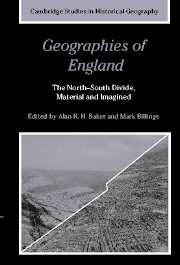Book contents
- Frontmatter
- Contents
- List of figures
- List of tables
- List of contributors
- Preface
- 1 Material and imagined geographies of England
- 2 The contemporary debate over the North–South divide: images and realities of regional inequality in late-twentieth-century Britain
- 3 Distressed times and areas: poverty, polarisation and politics in England, 1918–1971
- 4 Industry and identity: the North–South divide and the geography of belonging, 1830–1918
- 5 Divided by a common language: North and South, 1750–1830
- 6 South, North and nation: regional differences and consciousness in an integrating realm, 1550–1750
- 7 North–South dichotomies, 1066–1550
- 8 Cultural constructions of England's geography and history
- References
- Index
- Cambridge Studies in Historical Geography
1 - Material and imagined geographies of England
Published online by Cambridge University Press: 10 December 2009
- Frontmatter
- Contents
- List of figures
- List of tables
- List of contributors
- Preface
- 1 Material and imagined geographies of England
- 2 The contemporary debate over the North–South divide: images and realities of regional inequality in late-twentieth-century Britain
- 3 Distressed times and areas: poverty, polarisation and politics in England, 1918–1971
- 4 Industry and identity: the North–South divide and the geography of belonging, 1830–1918
- 5 Divided by a common language: North and South, 1750–1830
- 6 South, North and nation: regional differences and consciousness in an integrating realm, 1550–1750
- 7 North–South dichotomies, 1066–1550
- 8 Cultural constructions of England's geography and history
- References
- Index
- Cambridge Studies in Historical Geography
Summary
Two themes
Scholarly accounts of the historical geography of England since the Norman Conquest have tended to focus upon systematic changes in its population, economy, society and landscape. Although addressing ‘geographical’ issues, their organisational structures have led them to place more emphasis upon chronological (temporal) changes than upon regional (spatial) differences. By contrast, popular accounts of the changing geography of England in modern times have tended to emphasise a basic divide between North and South. To some extent, this difference in emphasis might be because the former have tended to focus upon material geographies and the latter upon imagined geographies of England. There is, therefore, a case for combining these two perspectives in an examination of both the material and the imagined geographies of England since the Norman Conquest. The central questions to be addressed in this book are: To what extent has a North–South divide – in diverse forms – been a structural feature of England's geography during the last millennium and to what extent has it been especially associated with, and recognised during, particular periods in the past?
The concept of a North–South divide has surfaced in recent political debates about regional contrasts in wealth and welfare in England but aspects of the concept can be traced in literature for almost two centuries. Famously, Benjamin Disraeli (1845) in his novel Sybil, or The Two Nations portrayed the existence of ‘two nations; between whom there is no intercourse and no sympathy; who are as ignorant of each other's habits, thoughts, and feelings, as if they were dwellers of different planets; who are formed by a different breeding, are fed by different food, are ordered by different manners, and are not governed by the same laws’.
- Type
- Chapter
- Information
- Geographies of EnglandThe North-South Divide, Material and Imagined, pp. 1 - 14Publisher: Cambridge University PressPrint publication year: 2004
- 1
- Cited by



